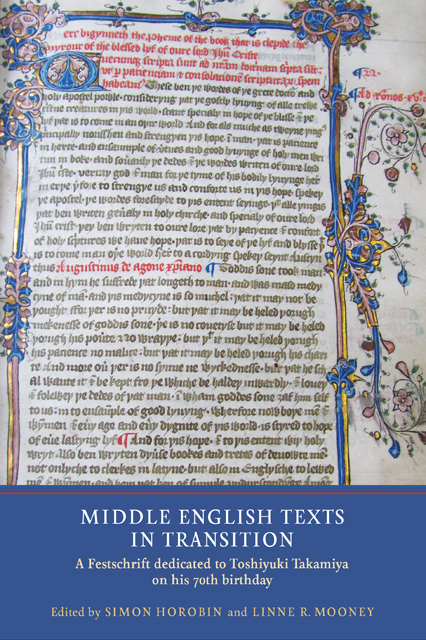 Middle English Texts in Transition
Middle English Texts in Transition Published online by Cambridge University Press: 11 March 2023
Cambridge, Magdalene College, MS Pepys 2125 (hereafter P) is a late medieval devotional miscellany, comprising two parts, each originally a portion of a different manuscript. It includes a number of unique versions and unpublished texts as well as popular writings commonly found in similar late medieval devotional compilations. There are various signs of remodelling. We may consider that the second part, in paper, represents the original manuscript, the first quire of which was probably lost, and that consequently another leaf was added to supply the beginning part of the first text in the remaining volume; then a portion of another manuscript (parchment) was joined to precede it; later hands added more texts on the blank pages at the end and on flyleaves. Five hands are responsible for all the various stages of the manuscript’s construction, while the loss of some leaves suggests further modifications.
The missing leaves have prompted studies associated with heresy hunting, specifically because of the manuscript’s immediate link with London, British Library, MS Harley 2398, a Lollard manuscript made in Gloucestershire. Dialectal features and writing on a strip of paper in the gutter of P point to a nearby provenance; more conclusively, two texts in P (‘On virtues and vices’ and ‘Easter Sermon’) were directly copied from the Harleian manuscript. The copies of Thomas Wimbledon’s sermon in both manuscripts are also closely related.
On the other hand, P has also been treated as an orthodox codex. Discussing the importance of the ‘material form’ of Middle English devotional manuscripts, Jill C. Havens contrasts orthodox manuscripts, including P, and heterodox ones, including Harley 2398.5 Indeed, the choice and arrangement of the texts in P do not present any specifically Wycliffite or Lollard features. On the contrary, many of the texts are concerned with ideas and practices that Lollards were strongly against, such as the eucharist, indulgences and images in devotion to the Cross and Passion of Christ. However, Brian Cummings is also reasonable when saying that ‘Lollards, not bishops, spoke religion in English’ and ‘[b]ooks were understood to embody heresy’; he notes that some heterodox writings were purposefully inserted into apparently non-problematic volumes.
To save this book to your Kindle, first ensure [email protected] is added to your Approved Personal Document E-mail List under your Personal Document Settings on the Manage Your Content and Devices page of your Amazon account. Then enter the ‘name’ part of your Kindle email address below. Find out more about saving to your Kindle.
Note you can select to save to either the @free.kindle.com or @kindle.com variations. ‘@free.kindle.com’ emails are free but can only be saved to your device when it is connected to wi-fi. ‘@kindle.com’ emails can be delivered even when you are not connected to wi-fi, but note that service fees apply.
Find out more about the Kindle Personal Document Service.
To save content items to your account, please confirm that you agree to abide by our usage policies. If this is the first time you use this feature, you will be asked to authorise Cambridge Core to connect with your account. Find out more about saving content to Dropbox.
To save content items to your account, please confirm that you agree to abide by our usage policies. If this is the first time you use this feature, you will be asked to authorise Cambridge Core to connect with your account. Find out more about saving content to Google Drive.